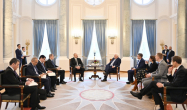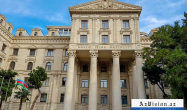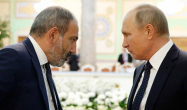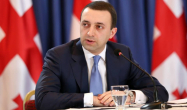The Double Agent Role, Starring Armenia - OPINION+ (PODCAST)
13:50 20.05.2022 21841
For instance, back in late March, the Russian government allowed independent importers to bring certain types of goods into the country without prior agreement with the trademark owner. This mechanism, otherwise known as ‘parallel import’, serves to meet the demand for goods, subject to intellectual property, which was not allowed without the permission of the intellectual property owner up until then. Basically, Moscow thus greenlighted ‘grey importing’.
In response, the West, seeking to achieve the set targets, is doing its best to prevent any splits within its own ranks and warns formidably the chasers of such grey schemes against rash decisions. But somehow, even when it comes to such a sensitive issue, one or two actors are strangely, albeit habitually, overlooked, although they tend to easily ignore these formidable warnings.
The demonstrative behaviour by Armenia, which rhetorically pursues a multi-vector policy, but indeed is wrapping itself deeper into a mantle of centuries-old vassal for Russia, is nothing but a call of dare against the collective West, as evidenced by numerous facts.
According to the data by the Main Directorate of Intelligence of the Ministry of Defense of Ukraine, Armenia has facilitated the conditions for doing business with Russian companies after the outbreak of hostilities. Moreover, these mercy rules were firstly offered in IT. It is worth mentioning that in such a short period of time Armenia has already managed to ‘shelter’ 113 Russian IT companies. At the same time, Russian citizens have established a thousand private enterprises and over 250 LLCs (limited liability companies).
Furthermore, the Armenian Ministry of Economy has even established a special working group to support companies that have moved into the country. These business entities pay taxes in both countries. At the same time, the benefits introduced by the Ministry of Economy of Armenia for IT entities allow Russian companies to receive a 50% refund of the income tax levied on new employees.
The said ministry also educates Russian banks and other financial institutions on monetary investments on their Telegram channel ‘Economy of Armenia’ and publishes tips on how to transfer money to Armenia through cryptocurrency. The chairman of the Central Bank of Armenia, Martin Galstyan, almost proudly announced that around 16,000 new non-resident accounts were opened in Armenian banks, most of whom are Russian citizens.
In other words, the structures that are part of the economic bloc of the Armenian government openly assist Russian companies and citizens to circumvent the Western sanctions regime against Russia. One of the key figures in this matter is the Russian businessman and oligarch of Armenian origin, who owns a 75% stake in the ‘Vardanyan, Broitman & Partners’ investment company, Ruben Vardanyan, who moved to Armenia after the war erupted in Ukraine. Vardanyan, who is also included in the Western sanction list, explained his move by saying that the new situation created new opportunities for Armenia, which can now become a ‘window’ for many Russian enterprises. Figuratively speaking, he designated Armenia as the ‘savior’ of Russia in its opposition to Western sanctions.
Having said that, Armenia has also become a ‘savior’ for dozens of thousands of Russians. The Russian Federal Security Service states that over the past three months, Armenia has welcomed around 134,000 Russians 'with open arms', who were suddenly lit by the idea of discovering what Armenian tourism had to offer. This would have been a perfect occasion for the Ukrainian President Zelensky to burst out harsh accusations against Armenia.
Incidentally, Armenia is the only Eurasian Economic Union member that has a Comprehensive and Enhanced Partnership Agreement with the European Union, which raises multiple interesting and uncomfortable questions for the West, firstly, Brussels. We all remember that the prelude to the violent events unfolding in Ukraine was precisely Kyiv's desire to sign the same agreement with the EU, which caused a harsh reaction by Moscow. Brussels, for its part, put forward a firm demand to Kyiv: It was either the European or the Eurasian Union. There was no third option. That is, there were no compromises or half-hearted solutions. But, for some reason, Brussels did not put forward such requirements for Armenia, which today creates preferences for Russian companies to circumvent the tough sanctions by the EU against Russia. Thus, Russian companies now have a unique opportunity to obliquely participate in the collection of 2.6 billion euros allocated by the European Union as financial assistance to Armenia.
By the way, one of the main articles included in this package is the digital agenda. Quite conveniently over a hundred Russian IT companies have emerged in Armenia, which can also facilitate turning Armenia into a hotbed of cyber danger. That is, the Armenian aggressive nature can also be heightened with a cyber-terrorist filling. You must agree that such an increased interest by Russian IT companies and high-tech specialists in impoverished Armenia cannot but cause suspicion.
It is strange that the US Embassy in Armenia is somewhat calmly watching these ‘mischiefs’ by Armenia. You must also agree that such an accepting attitude by the US, whose embassy in Armenia is the second largest staffed American diplomatic corps in the world, is a bit surprising at the least. Particularly in late March, the US National Security Adviser Jake Sullivan also mentioned Armenia, while making a formidable warning to countries Russia might use in efforts of circumventing financial isolation in order to maintain its economy. The list of these so-called ‘ill-wishers’ also included India, China, Saudi Arabia and the UAE (United Arab Emirates). A lot has flown under the bridge since then and there hasn’t been a day that the reports of the White House Administration and the US State Department did not voice statements about ‘developments’ and warnings against these countries. All, except Armenia, who always plays the role of a stool pigeon.
Well, isn't it about time for the United States itself, against whom Moscow is making insinuations about operating bio-laboratories in certain post-Soviet countries, to finally express concern about the high likelihood of a cyber-threat in Armenia, and most importantly, to extend the sanctions against Armenia as well, who has, despite many a warning, been helping Moscow to circumvent the harsh sanctions of the West.
Sahil Isgandarov, political analyst
Digər videolar
Azerbaijan marks 8th anniversary of April 2016 battles
10:11 02/04/2024
President Ilham Aliyev makes trip to Lankaran district
11:58 16/01/2024
Georgian parliament to discuss president's impeachment this week
16:54 17/10/2023
Rustam Minnikhanov visits Alley of Martyrs
12:48 18/06/2023
The Double Agent Role, Starring Armenia - OPINION+ (PODCAST)
13:50 20/05/2022
Let there be gas, no matter what! (+ PODCAST)
13:00 13/05/2022
Georgian PM to visit Azerbaijan
14:49 28/09/2021
Last group of Azerbaijani firefighters returns home from Turkey
11:18 19/08/2021


















